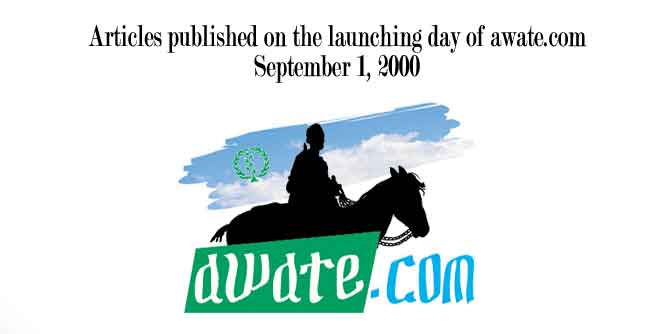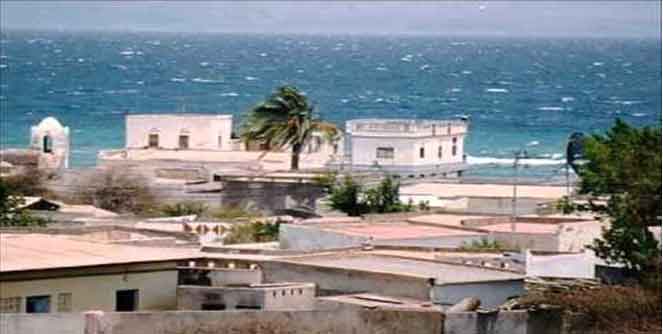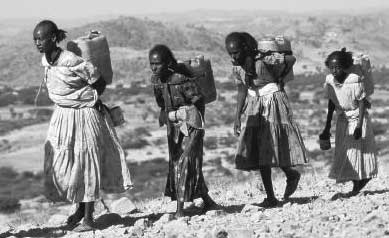Reconciliation and Unity: Vital Terms In Eritrean Politics

By Menhot Woldemariam (Woldeyesus Ammar)
Reconciliation and unity are two live terms in the dictionary of Eritrean politics, past and present. In recent years, I came to associate the two with some people and their thinking who volunteered to share their viewpoints through the Internet websites. In the old days, however, and not without reason, reconciliation and/or unity were automatically linked to the names of two giant patriots who laid the entire groundwork for Eritrea’s future statehood. Those names are Ibrahim Sultan and Woldeab Woldemariam.
Consult any writing, any interview, any speech, any cassette recording, any anything by these two national figures, and you can rest assured that you will count the words reconciliation and unity repeated more than any other key word in the material you happen to refer to. Why? Because they wanted to create one country and a united people – united not through fear or domination of one by the other, something that can also be done – but by coming together through dialogue and compromise based on mutual respect and understanding.
‘Yzkerekado?’ May be you, the reader, can remember this phrase. In his eulogy at the death of his friend in 1987, Woldeab Woldemariam apportioned 90 percent of the credit for preserving Eritrea’s territorial unity to Ibrahim Sultan, and wanted to remind us once more, and indirectly, his lasting message regarding what he considered to be the main challenge in the Eritrean society when he asked his fallen friend in these words: “Do you remember [Ibrahim Sultan] that the most difficult challenge in our struggle was safeguarding national unity?” We know what Ibrahim Sultan’s concurring reply could have been about the need for continued struggle for reconciliation and unity in Eritrea because it was only a few months before his death that he wrote the following words to EPLF’s second congress:
“[My children] make peace amongst yourselves. Be united…Don’t be Moslems and Christians. Avoid religious, ethnic and regional differences and confront your foes by forging solid unity”.
Today, Ibrahim Sultan and Woldeab Woldemariam may not be that important for those who do not know their contributions, or for those who conveniently take everything said and done before 1982 to be part of pre-history, or, still, to those ethno-centrists who had no good record in caring for Eritrea in its entirety.
However, we all know that, in his message to the EPLF congress in 1987, Ibrahim Sultan was not addressing the Rabitas and the unionists of the 1940s and 1950s. Forty years later, and only four years before the liberation of Eritrea in 1991, he was expressing the concerns he had about the lingering weaknesses in the Eritrean society. He called for reconciliation and unity of the country’s political and social forces, and he meant it. Woldeab fully agreed with his lifetime comrade-in-struggle. Both men never wanted to see one Eritrean party excluding – nay, denying – the others, for that wouldn’t eventually be for the common good of the country that both of them did bequeath in one piece to the present generation. And if the two builders of Eritrea’s national awareness were to revisit us on 1 September 2000, they would, unfortunately, be forced to repeat their old messages for reconciliation and unity.
What about you, the reader, and me? Do we really believe that we have the need for national reconciliation to strengthen our national unity, or is it an empty talk of the “disgruntled few”? It is generally believed that there exist at least three ways of looking at the problem, by three categories of people. These are:
Those who take for granted the slogan of the naïve, ‘Hade hzbi Hade lbi, and want to believe that everything is perfect. They would tell you: “we are united”, without even knowing up to where the ‘we’ extended. It is true that a good number of young Eritreans who, because of various reasons, do not yet know that that problem is there for real. Those below the age of 20 years make something like 42 percent of the population, and many of them are exposed to sources of control and misinformation. Also included in this group are adult Eritreans who never ventured to know the persistent causes of disunity in the society. Some remained confined to their physical environment and never tried to think about the concerns of the rest of the political spectrum in Eritrea. They are innocent and they would have to be informed.
The second category consists of those Eritreans who know that the problem is there but have long ago decided to resolve it through neglect, suppression and brute force. They would confide to each other in secret: “Many societies have done it, and it is to our interest to opt that way out”. This group includes not only those who find it politic to suppress and ignore other viewpoints, but also those who have no direct interest in power politics, but think that this is the easiest way to the much wanted end result, ‘Hade hzbi Hade lbi’. Therefore, there is no place for reconciliation, a term which cannot exist in their dictionary.
The third category comprises of individuals who wish to inform their countrymen and women that the unity process in Eritrea is unfinished and that an immediate action is required to correct our approaches to nation-building. Otherwise, the absence of reconciliation and unity will affect adversely the national awareness achieved during the past several decades.
The very history of our struggle with its civil wars and multiplication of fronts, some based on sectarian sentiments, speaks about unity or the lack of it in Eritrea. The fact that there existed more than half a dozen fronts at the hour of Eritrea’s liberation, and the fact that as many exist nine years after Eritrea’s independence, only emphasize the need for reconciliation in order to safeguard national unity.
During the years of the liberation struggle, it was a taboo and quite disgraceful for fighters to talk about “differences” in religion, language or region among the Eritrean people. Everyone wished to deny what really existed, but sheer denial could not put to the thin air the sources of “politico-social differences” and the consequent multiplication of fronts in the arena. It is true that the years of political and armed struggles of the past half a century brought the Eritrean people much closer to each other than ever before. Yet, differences lingered, in some instances reinforced by new internal and external factors.
However, Woldeab and his friend would still wish to shout at us in the following simple terms: “Hey, differences exist everywhere. They are nothing to be ashamed of. In fact, political differences are usually fueled by primordial sentiments like language, region and religion. Take any region: from Africa, through the Mediterranean basin (with its Cypriots or Lebanese or even the Serbs and their Kosovar/Bosnian “enemies”), across Europe to Northern Ireland of the ‘civilized’ Anglo-Saxons, and you have those problems in plenty. The thing to be ashamed of, kburan deQna, is not to have political and whatever differences, but to fail to address them through dialogue and compromise. Be careful of your Eritrea!”
And back to ourselves: why are we still not out of serious fears and concerns about disunity? Who is responsible for the delay to reconcile Eritrea’s political forces at least since 1991? This contributor is of the opinion that many Eritrean fronts did their level best to go back home and take part in the political, economic and social reconstruction of the country. But the leadership of the Eritrean Liberation Front (EPLF), and especially the leader of that front, who is not, historically, a good example of a unifier of the entire Eritrean people, blocked all prospects for reconciliation. Eritrea’s provisional government in 1991 decided to continue vilifying, rejecting and humiliating the other fronts and their total membership. This is a sad episode in the recent history of our people.
Contrary to the allegations and life-long teachings of hate and contempt of “others” by the EPLF leader, the undeniable truth is that all Eritrean organizations in 1991 happily accepted the victory of their struggle and, in their different ways, congratulated the Eritrean people. Almost all the fronts formally asked to be part of the new Eritrea which they hoped would respect the political and social forces that made up the nation. This was formally rejected. The EPLF leader announced on 20 June 1991 that all fronts other than the EPLF were rendered illegal and that anyone who preferred to be ‘duped’ by those organizations will be prosecuted for criminal acts.
In spite of this sad pronouncement, the other Eritrean fronts continued to hope that the rank and file of the EPLF and their sympathizers would understand what the call for reconciliation and unity meant for the future of the country. These fronts expected that their compatriots in the EPLF would disregard what the EPLF leader said on 20 June 1991 without consulting the nation. It was anticipated that his followers would disagree and, instead, find a better way so that the nation would start a new political life with the participation of all. But this course of action was not taken.
The political opposition now ranged against the Eritrean government had exerted strenuous efforts for reconciliation immediately after Eritrea’s liberation. The steps undertaken by the Eritrean Liberation Front – Revolutionary Council (ELF-RC) for national reconciliation and unity in 1991, which are summarized below, can show in a nutshell how much Eritreans yearned to unify the ranks of their New Eritrea.
On 30 May 1991, only five days after the liberation of Asmara, the ELF-RC issued a statement which confirmed acceptance of the new government in Eritrea until arrangement for fuller political participation was worked out. The statement said: “… Concerning the 29 May 1991 declaration of a provisional Eritrean government by the EPLF, the ELF in principle takes it as a step in the right direction for the consolidation of an Eritrean entity and endorses this measure as an urgent necessity”. The ELF-RC statement called for the immediate declaration of independence, national mobilization to safeguard the victory and the need of “concretizing national consensus with the participation of all Eritrean political forces to guarantee national independence and social peace”.
A week later on 7 June 1991, the same ELF-RC issued a policy statement advising the new regime in Asmara to heed the calls of other fronts. It said: “Playing ostrich and denying the existence of several national organizations with different political standpoints in the Eritrean arena today is absolutely unacceptable. All the Eritrean fronts have, no matter when and how much, contributed in the national liberation struggle and, today, there cannot be a single Eritrean front possessing the right to exclude any of the other fronts from safeguarding national gains.” The statement added: ” We in the ELF-RC acknowledge the additional responsibilities the EPLF can shoulder in consolidating national capacities and concretizing our relentless drive on the road to national independence. The other Eritrean political forces, therefore, have the responsibility of suspending old differences and join hands with the EPLF in the task of undertaking correct measures leading to the creation of an independent state of Eritrea. ”
As a warning to all, the statement added: “We are passing through an important period in the history of our national struggle. The fate of our future generations hinge upon what we do today. History will pass its judgement on us all if we ever let this chance [for reconciliation] slip away”. What else could be expected of a political organization other than asking a sister liberation organization to come to terms and work for the country.
The ELF-RC did not despair. It contacted all the political fronts and advised that the new regime be encouraged to be inclusive and allow participation of all political forces by inviting a national conference in which a new Eritrea of all could be launched.
The ELF-RC also wrote to the EPLF leadership, and at some stage secured an invitation to meet with the provisional government. Unfortunately, and like Wa’ala Biet Giorghis of the old days, the reconciliation of Eritrean parties could not be worked out. No one can tell if there were external forces involved to disrupt the reconciliation process, also this time round. (The rumour of the time, that the EPLF leader in 1991 agreed to never reconcile with his opposition in exchange for support and recognition of a great power and its regional ally, still remains a black hole crying for substantiation.)
Whatever the reason behind it, the EPLF took steps to discourage and stop the suggested meeting from taking place. To this end it informed its representative in Khartoum, Mohammed Ali Omaro, to tell the ELF-RC chairman, Ahmed Nasser, and his delegation to come to Asmara for a meeting. Contrary to their expectation, the ELF-RC agreed to go to Asmara for talks. In October 1991, tickets and other travel arrangements were made ready and a seven-person ELF-RC delegation was awaiting a green light from Omaro to travel to Asmara. But one fine morning, Omaro again contacted the ELF-RC and informed them the meeting scheduled in Asmara was postponed for an indefinite period.
That was the end of it. What followed was an all-out EPLF armed campaign in the Gash-Setit area to liquidate the small units of the Eritrean Liberation Army which were already informed by their leadership that there won’t be any armed confrontation with a national army of independent Eritrea. Those who were taken prisoner at that confrontation of January 1992 are still in EPLF dungeons.
This, in brief, is part of the struggle for reconciliation and unity that the Eritrean fronts conducted after liberation. The efforts were foiled by the EPLF leadership.
Why is the EPLF confrontational even in solving internal issues of the society? It is possible to have problem of disunity in a setting like Eritrea’s, but no one can understand why one refuses to accept and discuss the problem and reconcile amongst one’s own compatriots. Why deny the existence of political rivals? Why refuse to accommodate fellow fighting fronts? Why did we have civil wars in the first place and who, more than anyone else, stood against reconciliation all along the years of struggle? Why continued stance against reconciliation after independence? And why so many internal “enemies”? Why so many hostilities against one’s neighbours after independence? Why…why, why? These questions need to be addressed by all, and not only by some Eritreans.
More…



Awate Forum